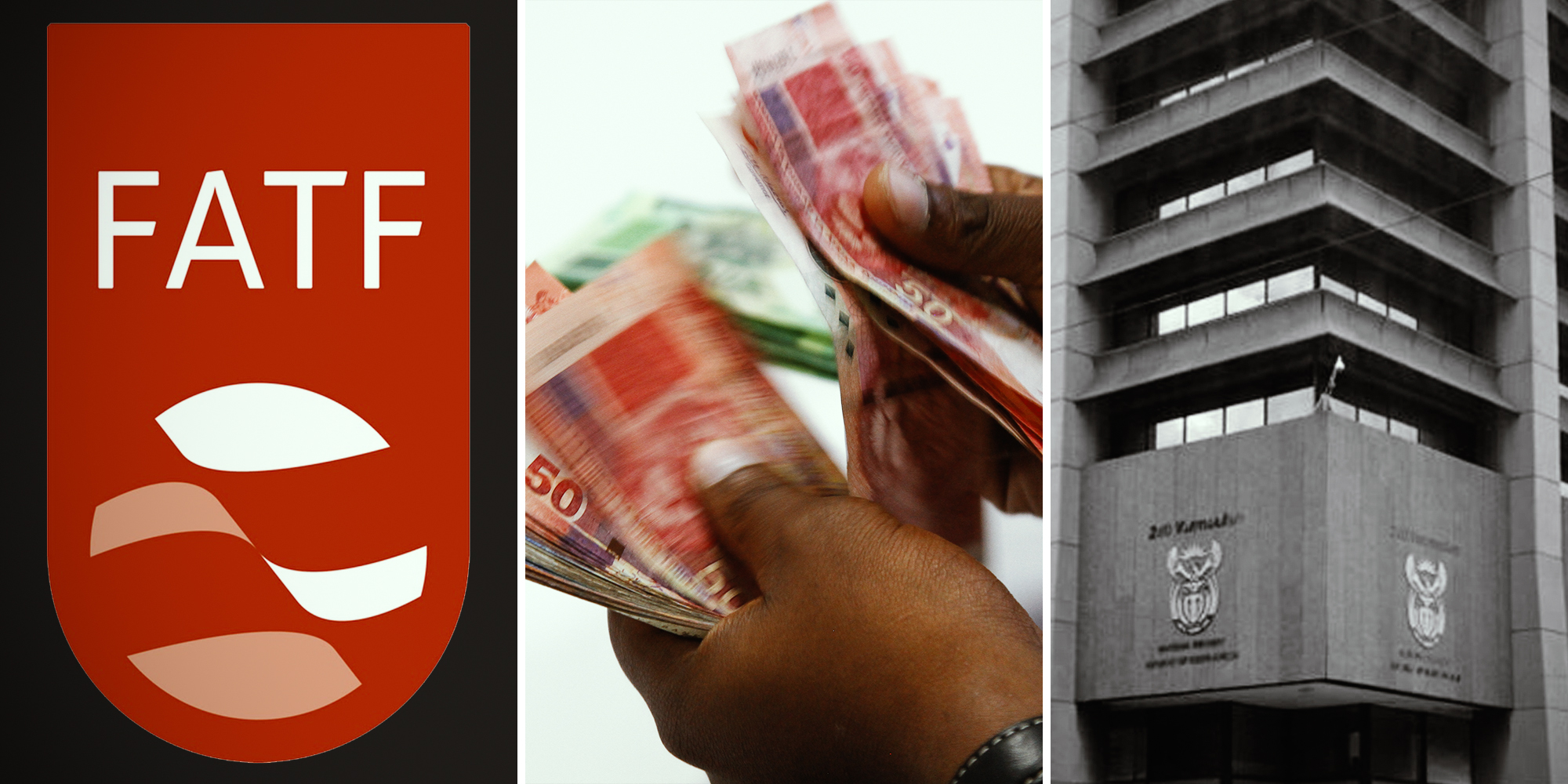South Africa may soon be removed from the Financial Action Task Force (FATF) greylist, with the latest plenary confirming that the country has now met 37 of the 40 technical compliance benchmarks, as noted by Minister of Finance Enoch Godongwana in his budget speech today.
This progress marks a significant improvement from the initial FATF assessment in 2021, in which South Africa was found non-compliant in key areas of financial crime enforcement and regulatory oversight.
“Funds are allocated for enhancing the financial forensic and accounting capabilities in our law enforcement institutions, to further strengthen our ability to detect and prosecute complex economic crimes,” stated the minister during his speech.
Join Daily Maverick’s webinar: The Budget Finally Lands: What you need to know
The greylist designation, which South Africa has been trying to shake off since February 2023, has placed additional scrutiny on its financial sector, raising concerns about capital flight, investor confidence, and the increased cost of doing business.
With only two outstanding deficiencies remaining, the country could exit the greylist by October 2025, pending FATF’s final assessment.
“The rewards of higher financial compliance take time. Our efforts to strengthen anti-money laundering and counter-terrorist financing regulations have shown clear results, and we remain committed to full alignment with FATF recommendations,” Godongwana stated in the Budget Review.
Why we were are in the grey
FATF’s decision to greylist South Africa in 2023 was primarily due to its weak enforcement of anti-money laundering and counter-terrorist financing regulations.
The country’s 2021 mutual evaluation report found significant gaps in prosecutorial capacity, beneficial ownership transparency, and supervision of high-risk sectors, including financial institutions and non-profit organisations.
The greylisting has had measurable economic consequences — banks and international financial institutions have imposed stricter compliance requirements, slowing cross-border transactions and increasing operational costs, and South African businesses trading internationally have faced enhanced due diligence measures, adding pressure to an already constrained economy.
The progress so far
Following its greylisting, South Africa was placed under a FATF-monitored action plan, with specific reforms required to demonstrate improved compliance and enforcement capabilities.
At the October 2024 FATF plenary, South Africa achieved a 37/40 technical compliance rating, a significant milestone in meeting global anti-money laundering and counter-terrorist financing standards. However, technical compliance alone is insufficient — FATF also requires evidence of sustained enforcement and effective prosecution of financial crimes.
Read more: From Bitcoin to bail: Terror funding accused’s court appearance highlights South Africa’s growing risks
The February 2025 plenary confirmed two remaining areas where South Africa must demonstrate progress:
- Increased prosecution of money laundering and terrorist financing cases.
- Stronger oversight of non-profit organisations and informal money transfer services.
The Treasury has committed to resolving these deficiencies by June 2025, with the aim of securing full FATF compliance before the next review in October.
Reform and enforcement — the 2025 strategy
The Treasury, in coordination with the Financial Intelligence Centre, the South African Revenue Service (SARS), and the Reserve Bank has undertaken several initiatives to fast-track compliance.
Legislative amendments introduced in late 2024 expanded prosecutorial powers for financial crime cases and improved cross-border money movement tracking. Budget 2025 allocates R2.1-billion towards bolstering enforcement capabilities, including additional forensic auditors, compliance officers, and financial crime investigators.
The Financial Intelligence Centre has intensified its oversight of high-risk transactions, leading to a 20% increase in suspicious transaction reports filed in 2024 compared with the previous year. SARS has also launched AI-driven monitoring of tax discrepancies, targeting businesses and individuals suspected of financial misconduct.
Investment impact and economic stability
Exiting the greylist would be a major win for South Africa’s economic outlook. Investors and financial institutions have already signalled that compliance progress is being closely watched, with foreign direct investment (FDI) levels dipping since the greylisting.
According to the Treasury, greylisting has resulted in higher due diligence costs for businesses, particularly in industries reliant on international financing. South Africa’s risk rating on global financial indices has also been affected, influencing lending terms and increasing capital costs.
A successful removal from the greylist would reduce these compliance burdens, restoring confidence in the financial system and improving the ease of doing business in the country.
The road to the October 2025 plenary
The Treasury will submit its final compliance report to FATF by June 2025, outlining the measures taken to address the last two remaining deficiencies. If FATF is satisfied with the enforcement progress, South Africa’s removal from the greylist will be confirmed at the October 2025 plenary session.
Bradley Elliott, chief executive of anti-money laundering platform RelyComply, says consistency is key to fighting global money laundering, adding that South Africa offers an example of how a positive change in compliance culture can support the global fight against financial crime.
“South Africa’s efforts to get removed from the Financial Action Task Force greylist have helped to improve its economic reputation and close loopholes criminals were exploiting,” he said, noting that this had also forced better cooperative efforts between government bodies, financial institutions, regulators and prosecution authorities.
“Indeed, a better future for fortified anti-money laundering compliance lies with transparent ultimate beneficial owner registers, customer verification, and shared knowledge around fincrime risk identification methods. This shows why regulators worldwide should be careful when balancing ease of business against the need to stop money laundering in its tracks,” he said.
The final hurdle remains proving the effectiveness of these reforms. FATF will be looking for evidence of successful convictions, enforcement of penalties, and an increase in financial crime case resolutions. South Africa’s financial regulators have stressed that while progress has been made, full compliance must be demonstrated in practice, not just on paper. DM





